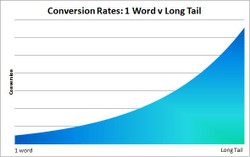
What is a Long Tail phrase and how do I use them on my website?
by SimeyC
The Long Tail phrase is simply a sentence containing keywords - however, the use of them is becoming one of the more important aspects of SEO.
Why use Long Tail phrases?
What is a Long Tail Phrase?
Firstly I must note that as an amateur writer some of the more complex SEO techniques often evade me, however the Long Tail is a very simple concept and one I can readily use in every article I write without compromising the flow of the article. To put it simply a Long Tail Phrase is simply a sentence of more than three words that is ‘packed’ with keywords – sadly this does mean you still have to do some keyword research though!
The aim of the Long Tail is to create a phrase that people will search for – it’s more of an exact match than a ‘fishing’ around for keyword search – thus you may end up with lower page views, but these will be targeted page views that will hopefully lead to sales or click-throughs. As an example you might be writing an article on how to cheat on a video game – the first thing you will do is to write down your keywords – cheat, game, pc, codes are some examples. I then want to arrange these keywords into a sentence that is likely to be an exact search – at this point you should come up with three or four different sentences:
- How do I cheat on gamename?
- How do I cheat on gamename for the PC?
- What are the cheat codes on gamename?
- How do I enable the cheats on the gamename for the PC?
Now you can use the Keyword Research tools to refine these and come up with high traffic, low competition phrases
Do you use Long Tail phrases?
How do I use Long Tail Phrases on a website?
The Long Tail is a targeted phrase so it should be used as the heading to your website, but also should be repeated within your content occasionally. You can also bring in some of the variations of your Long Tail within your content and also as tags – the more chance the Bot has of finding different phrases within your site the better chance you have of ranking highly within the search engines.
The most important thing though is not to stuff your page with Long Tail phrases – they must not stop the flow of the article, and must not detract from the facts and content you are providing – if a reader simply sees the same phrase repeated and regurgitated over and over again then they will lose all trust and probably leave your page.
It is a balancing act, and one that takes time to master to get the best results – a general rule of thumb is to try and use the phrase every 200 words or so. With some it is possible to continue to re-use them, especially when the site is ‘informative’ but where you are selling a product then it is very off-putting to see the name of the product ever other sentence – it’s simply irrelevant and will lose customers.
 |
| The Long Tail: Why the Future of Business is Selling Less... Grand Central Publishing |
What should I consider once the Long Tail has brought in traffic?
There are many factors that must be considered when using Long Tail Phrases. As the phrase is highly specific, then you are not going to attract millions of visitors to your website, however you are going to get targeted traffic that is visiting your site for a reason. Therefore the following factors become important:
- Give the facts quickly and accurately. As your audience is a targeted one, they are looking for information not waffle – if you do not have decent information in the first few paragraphs then you will lose your visitors. Be factual, be concise, be clear.
- Do not be afraid to be truthful – if the product is poor, then say that – tell the consumer why it is poor, but then suggest alternatives – this builds trust as you are not simply giving the consumer what they want, but providing advice and showing that you are an expert on the product.
- Give alternatives – even if the product the viewer has searched for is brilliant, give them some comparisons to similar products – often a simple table comparing the benefits of various products is a great way to give information.
So I have my Long Tail phrases in place, that’s all I need to do to rank highly?
No – sadly if it were that easy there wouldn’t be a whole industry devoted to SEO; the Long Tail is one of the tools that helps your website rank higher in the search engines but you must use back-linking, keyword research, competition research and a multitude of other SEO tools to gain the maximum exposure to search engines – the more techniques the better.
One underlying comment though is that if you’re article is full of garbage, then no matter how high your ranking, you will not get sales – quality is going to become a more important factor as the ‘+1’ social aspect of Google takes hold – if you get visitors to trust you then they will hit the ‘+1’ button and you will improve rankings thanks to the new social aspects of search engines.
You might also like
How to Submit Your Website to Google and Other Search EnginesYou wrote an article and publish it on the web but nobody visits it. One of t...
My Seven Deadly Sins Of Search Engine OptimizationSearch engine optimization (SEO) is not a rocket science, but due its complex...



 Top Next Generation Consoles in 2014on 05/15/2014
Top Next Generation Consoles in 2014on 05/15/2014
 Top Science Fiction and Fantasy Authorson 05/14/2014
Top Science Fiction and Fantasy Authorson 05/14/2014
 What is a Chief Information Officer (CIO)?on 02/27/2013
What is a Chief Information Officer (CIO)?on 02/27/2013
 Guest Posting - are they worth it?on 06/20/2011
Guest Posting - are they worth it?on 06/20/2011


Comments
A good perspective on the mystery that's SEO.
I think I use both long and short.I been studying the wonder wheel the past few days to improve traffic.
good information.:-)
MIchey: some great tools you've listed there!
MightyDreamer: I neglected this subject entirely until the Google Pandemic hit!!!
Good post I use both simple tags and long tail tags, and I decide about them using:
1)Google Adwords tool
2) Samurai software
3) Keyword Optimizer Pro software by Dave Guindon
Thanks for an informative post